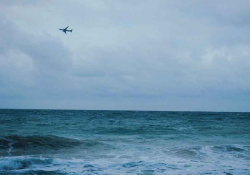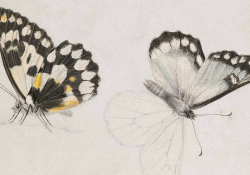Three Poems
[untitled]
Dear Lombard fog maternal dense
six in the morning, winter,
espresso machines are steaming
in the first bars to open in the square.
The city of gravestones is quiet, each has a name:
under the same blanket
the unclaimed dead
waking together make a cheerful racket,
voices, sneezes, insults, heads hollow
they all want something
as if they were still alive:
a sign, a joke, hot coffee.
Only he wants nothing:
“Cover yourself,” he says, as he once did,
“It’s cold this morning,”
and “Have you done your homework?”
It’s his torment; afterward he consoles himself,
almost as if he had been at Austerlitz, at Wagram,
1812, the Russian campaign,
water, ice, and corpses,
the Battle of Berezina and that man of destiny
who succumbs to a Europe of nobodies,
a Europe that never ends,
demain c’est Sainte-Hélène,
demain c’est le tombeau,
and he speaks loudly of errors,
incompetent comrades.
Ney, the traitor . . .
These bums, these Siberians
that know nothing
some dumbfounded some attentive:
History pleases the toothless,
the naked public
bravo! they cry, and again! and what did you say?
Their skulls are wet
on this cruel muddy dawn
mother fog and a revelry of fasting:
bravo, continue! death to this world,
death to the traitor Talleyrand!
Yourcenar
Head covered, all wrapped
by your cloak
so perfect for breezy Flanders
and for stormy Maine
man, woman – who cares?
When it comes, you used to say,
death can’t help but rejoin me
to the little girl I was, la petite fille
qui j’étais autrefois,
the child waiting for me
outside of time.
I wonder how you’ll do it.
Will you reenter her
as shadows do the night,
or as the last version of writing
overlaps the first?
Your face has sunk
to the sides of your mouth –
old dog! –
but your eyes, steady, see in the dark,
white corneas, black pupils,
and laugh
from the starless woods
sister
owls.
Caproni
Old-baby, pepper and vanilla,
it’s hard to say where you are,
you who mistrusts places and even names,
barely accept
that your name is Caproni.
You are where
afloat one sees nothing
but the water makes bubbles,
it’s your whirlpool of rhymes
that rise from nowhere: just pop up.
Or you’re by the board of departures and arrivals
when the trains are unmoving
in the station at dead of night
and those alive have given up.
Or you’re in church, on a weekday morning,
alone, spying on saints
at an altar you don’t believe in,
or Sunday night at a tavern
among hunters, like a roe deer
disguised as a human.
But what you see meanwhile
a mouse, a flower, wine,
the lost way and a beastly life:
o cruel magic
for the fresh trembling of your heart.
You’ve had it with poetry with prose with history:
history is chilling, you said, and conflict
isn’t your strength. Your aim was you.
How well I know it.
And victory?
Only this passion
to sing, to tell, and to disappear.
Translations from the Italian
By Lisa Mullenneaux













